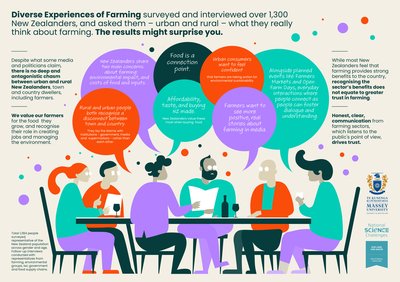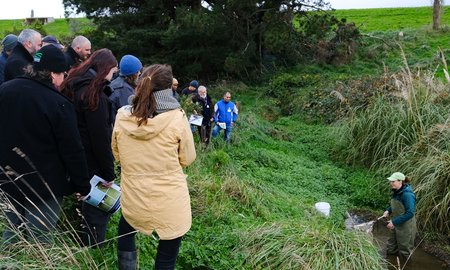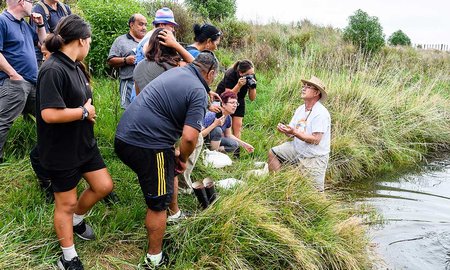
The Diverse Experience of Farming project sought to understand the underlying assumptions informing people’s perceptions of farming.
Farming is often at the centre of debates pitting town against country, based on a perceived deep divide between the urban and rural public. But this perception is not reality, says new research from Te Kunenga ki Pūrehuroa Massey University.
The Diverse Experience of Farming project, co-funded by Our Land and Water National Science Challenge, found that this concept doesn’t reflect reality. In fact, New Zealanders across all regions, genders, ages and ethnicities value our farming sector.
The research surveyed and interviewed over 1300 urban and rural New Zealanders to build a picture of attitudes to farming in Aotearoa New Zealand, and to understand the underlying assumptions informing people’s perceptions.
School of People, Environment and Planning Senior Lecturer Dr Alice Beban says, “Our research team wanted to test the pervasive idea of the rural-urban divide. Instead of a divide, we found a more complex and richer diversity of opinion about farming."
“New Zealanders across urban and rural areas recognise and value farming’s contribution to the country," she adds.
The key points of connection between New Zealanders in rural and urban areas (including the one in five people who identified as both urban and rural) are food, costs, jobs and caring for the environment.
The research found that New Zealanders value the food produced on our farms. When purchasing food, affordability and being locally grown was a significant factor in decisions for all survey respondents, along with taste, nutrition and animal welfare.
Costs were a common concern for all, with more than 60 per cent of all respondents highlighting costs as a key concern. For urban consumers, the focus is cost of food, and for farmers it is cost of inputs.
Farming ethically and caring for the environment was another strong connection point, with many people identifying environmental impact, animal welfare and sustainability as relevant topics when thinking about farming.

School of Agriculture and Environment Senior Lecturer Dr Janet Reid says that recognising the sector’s benefits does not equate to greater trust or knowledge about farming.
The research shows that urban consumers want farmers to be transparent and clear in communicating their sustainable practices, and are more concerned about supply chain issues and food quality than farming communities. Meanwhile, they don’t share farmers’ key concerns around government interference in farming, misinformation and mental health.
Surprisingly, urban consumers and farmers and rural people do not blame each other for this lack of trust, with respondents showing a sophisticated understanding of challenges facing the sector such as climate change, high prices, farm debt and increasingly tight regulations.
Instead, people across regions tend to point the finger at government, media and supermarkets, who they consider to be creating or promoting an urban-rural divide.
“More than half of urban respondents claimed that supermarkets are the most influential source of information about farming. Neither urban nor rural consumers believe supermarkets are fulfilling their responsibilities to farmers," Dr Beban says.
Likewise, rural people believe that government isn’t fulfilling its responsibilities to farming, highlighting interference and regulation that is not effective, clear, or practical.
Māori respondents on average disagreed with the statement that the farming sector is fulfilling its responsibilities to Māori, while other ethnicities also disagreed with this statement, though less strongly. New Zealanders across ethnicities were positive about buying food from Māori owned and operated farms.
“There are diverse views of farming across urban, rural and farming communities. But we all agree that the benefits of food and jobs that farming provides are valuable for New Zealand," Dr Reid says.
"People genuinely desire engagement in dialogue and want trust and connection. Farmers, government, supermarkets, agribusiness, primary sector organisations and urban people all have a role in building this connection.”
The Massey researchers, collaborating across disciplines, are following up this work with an exhibition to share their results with the public and farmers alike.
The research team will be holding an interactive exhibition at the Palmerston North City Library in November so people can contribute their thoughts to the ongoing research; and for farmers a local field day is being planned at the university.
The research team wants to continue the conversation and explore possibilities for strengthening connections.
Related news
Waterway restoration and protection the aim of Massey-led project
A project aimed at enhancing the rural sector’s capability to improve essential freshwater on farms has been awarded funding from the Ministry for the Environment’s Essential Freshwater Fund.

National Science Challenge grant supports sustainable land use research
Research project aims to spark conversation and encourage collaboration between people and groups with different ideas about how land and water should be used.

Improving water quality in King Country key aim for Massey professors
Professor Russell Death and Professor Ian Fuller have been granted $50,000 from the Our Land and Water National Science Challenge.
